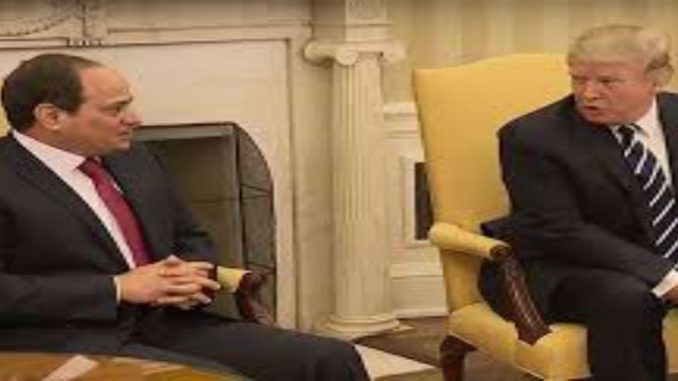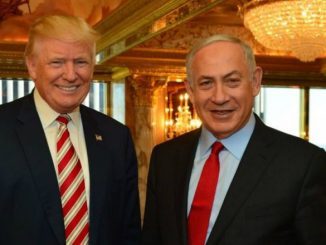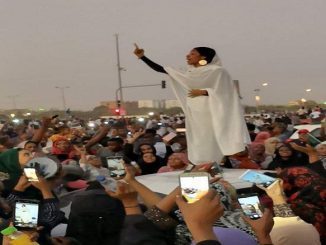
After Al-Sisi’s return from the Arab Islamic Summit, many observers believe that he is in the middle of the road for choosing either the United States or the Russian Camp in the coming period.
After the Egyptian-Russian rapprochement during the last two years, the relations have come to a stalemate period.
Political experts believe that the Egyptian-Russian relations are in a standoff stage especially after the recent warmth between Egypt and the new US administration, which appeared in the possibility of Cairo’s participation in “Arab NATO” under Washington supervision, and the recent reconciliation between Egypt and Saudi Arabia.
Egypt’s Foreign Policy the last Two Years
After the military coup in 2013 against Egypt’s first democratically elected President Mohamed Morsi, al-Sisi’s main aim was to seek political recognition for his regime and to have a strong financial support to boost the country’s economy.
Regarding the financial support, the Arab Gulf states have provided Egypt with unprecedented financial support.
The U.S. and Egypt’s relations soared under the former administration of Barack Obama, which admonished Cairo for its rights abuses following the military coup in 2013.
In 2013, the U.S. suspended military aid to Egypt before resuming it two years later, but Obama never extended an invitation to the Egypt’s military dictator after he assumed office in 2014 amid continued human rights violations.
Moreover, during Obama administration, “The State Department’s human rights report accuses Sisi’s government of stifling basic freedoms and enforcing its repression through torture, the disappearances of critics, and arbitrary arrests and killings.”
As a result, al-Sisi started to get closer to Russia. Egypt has signed contracts with Russian companies for nuclear power reactors and advanced fighter aircraft.
Egypt was stung when the U.S. delayed the delivery in 2014 of paid-for attack helicopters Egypt claimed were needed for counter-terror operations in the Sinai Peninsula – the first time the U.S. had used the Foreign Military Sales “nuclear option” of withholding spare parts or denying delivery of equipment.
Egypt took the lesson and is diversifying its supplier base, by signing many arms deals with Russia.
However, the improvement of the Egyptian-Russian relations was not priceless.
Egypt’s al-Sisi had to abide by and align with the Russian axis in various political occasions, which caused tensions with the Arab Gulf allies.
Last October, Egypt voted in favor of a Russian-backed draft resolution in the UN Security Council on Syria, which was opposed by Saudi Arabia.
As a result, Egypt’s stance angered Egypt’s major Gulf backer which condemned Egypt’s vote and described it as a ”painful” stance.
After the voting, the Saudi ambassador to the UN, Abduallah al-Mouallimi said, “It was painful that the Senegalese and Malaysian stance was closer to the Arab’s consensus than the Egyptian delegation.”
He also said that he feels pity for these countries that voted for the Russian resolution, stressing that his country will continue backing the Syrian people by all means.
Two days following the voting, Saudi state-owned oil company Aramco announced halting oil product supply to Egypt.
However, a new shift has occurred right after the U.S elections.
There is no doubt that new American President has expressed his admiration to al-Sisi describing him as a “fantastic guy” during his electoral campaign.
But the picture started to be more obvious when Abdel Fattah al-Sisi visited Washington, last April. During al-Sisi’s visit, President Donald Trump told him that U.S. support for his country is unwavering.
Trump said, “You have a great friend and ally in the United States and in me.”
Trump also said as he sat beside al-Sisi in the Oval Office, “We agree on so many things.” He added, “I just want to let everybody know in case there was any doubt that we are very much behind al-Sisi. He’s done a fantastic job in a very difficult situation. We are very much behind Egypt and the people of Egypt. The United States has, believe me, backing, and we have strong backing.”
As a result, Trump’s flattering words to Egypt’s al-Sisi during his first official visit to the United States of America admitted the sharp shift from Obama Administration.
Moreover, the Egyptian Saudi relations has signaled a potential thaw in relations after months of tension after abruptly suspending delivering shipments of petroleum products last October.
In fact, the timing of the reconciltion as well as Trump’s backing to the Arab NATO gave a strong indication that Trump administration has ordered Egypt to reconcile its differences with Saudi Arabia for the coming period.
This clearly clarifies why Abdel Fattah al-Sisi assured US President during the Washington’s visit hat Cairo will hand over the two strategic Red Sea islands to Saudi Arabia.
According to a US-based Egyptian diplomat,who spoke on the condition of anonymity, said “Sisi said that Egypt has not pulled back from the deal and that they are serious about carrying through with it after parliament approves the legal requirements.
Is Al-Sisi in Trouble?
Since al-Sisi’s return from the US Islamic Summit in Riyadh, the Egyptian media said that al-Sisi is in real trouble as he has to choose between US or Russia the coming period.
In this context, Abd al-Mohsen Salama, the journalist at al-Ahram, wrote an article, titled: “America or Russia?”, where he said that the recent warming of the the US-Egyptian relations has opened the door to questions about the future of the Egyptian-Russian relations.
He also said, “Is it better to build strategic relations with US away from the Russians or is it better to have strategic relations with Russia away from the American hegemony?”
In the end of his article, he said that we must have strategic relations with the Americans but not on the expense of the Russian relations.
Moreover, Emad al-Deen Hussein, the journalist at al-Shorouk, wrote that Trump’s visit to the region is against Egypt’s interests.
He also said, “Did Egypt have to boycott this summit?”
He continued, “Frankly speaking it was difficult to enter an open conflict with Saudi Arabia and America especially after the situation improved after a period of tension.”
Does Egypt still Have a Regional role?
Since the coup, Egypt’s regional role has eroded due to its adoption of a foreign policy based on beneficial interests with different camp than its former allies in the past years.
Egypt’s al-Sisi tried to have a switch alliances based on interests.
Once with Gulf countries and once with their key enemies represented in Russia, Syria and Iran which has been causing tensions with his financial backer, most notably Saudi Arabia.
This in fact infers that the north African country’s role has turned more to a proxy state rather than a regional power with an independent clear vision that aligns with its national security interests or its regional position in the Sunni Arab world.
In addition, even now as Trump administration is shaping a new strategy that endorses the key traditional Sunni allies in the region, al-Sisi found himself in the middle road again to choose one camp which is still based on others agendas rather than Egypt’s will.
As if al-Sisi has a real independent will, he would have a chosen a clear path and role to his country from the beginning.
But instead it seems that he limited Egypt’s role in other countries agendas to overcome his failure in the domestic economic front.
Accordingly, as Trump met with Prime Minister Netanyahu, Trump articulated a shifting dynamic in the region, that of Sunni Arab regimes viewing Iran rather than Israel as the main threat to their national security.
This was followed by reports that President Trump is supporting the formation of a NATO-like Arab alliance, which would include Egypt, Jordan, Saudi Arabia and the UAE. Israel, not formally part of this alliance, would coordinate closely with it.
This idea of an Arab military alliance is not new, it was suggested by al- Sisi in February 2015 and set in motion by the Arab League during the Sharm El Sheikh summit in March 2015.
Even though al-Sisi publicly endorsed the call for an Arab military alliance during his honeymoon period with the Gulf countries, the initiative wasn’t activated.
On the contrary, Egypt has only played only symbolic role in the war in Yemen. It has also played no effective role in the war in Syria or Libya. Al-Sisi even went farther than that when he has publicly opposed intervention in both Libya and Syria, following the line of supporting “national” armies; in the case of Syria, offering moral support to the Iranian backed Assad regime.
This should raise questions regarding Egypt’s willingness to play an effective role in any proposed conservative Sunni Arab alliance aimed at containing Iran and thus, abort its relations with Russia.
Egypt, as the most populous Arab Sunni state with the largest army, is expected to play an integral role in any proposed alliance.
As a result , Egypt’s leadership is in a rather difficult position between appeasing allies, most notably the United States and Saudi Arabia, and being confronted by a its closeness with the Russian axis especially that both shares common views in Libya and Syria.
In the end, there is no doubt that al-Sisi is now in a very difficult situation to choose one of those camps either the U.S. or Russia. But, whether he chooses this or that camp, it clearly infers the fact that Egypt’s al-Sisi has no free independent will and that he has limited Egypt’s foreign policy to the adoption of others’ dictated agendas.



